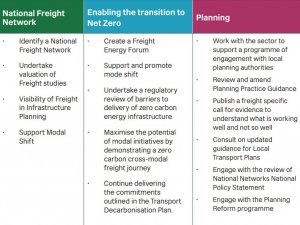Future of freight: What businesses need to know
11th July 2022
Real Estate and Planning partners Adam Reed and Richard Sagar, members of Walker Morris’ cross-discipline Logistics team, summarise the key aspects of the UK government’s new paper, Future of Freight, which plans to address challenges currently facing the freight and logistics sector.

Supporting the freight and logistics sector
Supply chain challenges, border disruption and labour shortages caused by Brexit, Covid and the 2021 Suez Canal blockage, as well as, more recently, fuel price rises and the impact of the Russian invasion of Ukraine, have all brought into sharp focus just how much the UK depends on freight and logistics, and also how much the sector needs support.
On 15 June 2002, the Department for Transport (DfT) published what it hopes will be an effective framework to address issues facing the sector: its Future of Freight plan.
What are the key aspects of the Future of Freight plan?
The cross-modal [1] Future of Freight plan identifies five priority areas in which support, investment, change and innovation are required:
- The cross-modal National Freight Network will enable government to identify, and then invest in, strategically important freight corridors across the UK
- The Freight Energy Forum will facilitate a joined-up approach to energy and fuel infrastructure plans, research and technology and Net Zero targets. It will also aim to maximise funding opportunities for freight energy and fuel infrastructure deployment
- A comprehensive review of existing planning practice will be undertaken with the goal of achieving a planning system which recognises the needs of the sector, and empowers planning authorities to plan for and address those needs
- The Generation Logistics campaign and related training schemes will aim to improve perceptions of the sector, improve diversity and address skills shortages now and in the future
- The Freight Council and Freight Innovation Fund will aim to evaluate and improve how the sector harnesses technology and data to meet real-world challenges.
Specific proposals are advanced in relation to each of those areas:


Broadly, the Future of Freight plan sets out a five year plan in which the government commits to:
- Building awareness of the sector’s challenges and exploring how innovation, technology and digitalisation can address those challenges
- Accelerate adoption of commercially ready solutions by undertaking research into where best to target future financial support for the sector, and making funds available to test technologies and innovations
- Working with industry to improve knowledge and data exchange, with a view to increasing efficiency and adding value for customers and businesses within, and reliant upon, the sector.
What will this mean for businesses working in, and with, the freight and logistics sector?
The plan states that progress will have been made when:
- Industry sees an uptake in innovative technologies and digitisation
- Government and industry have access to, and can therefore benefit from, more co-ordinated, consolidated and more useful data from across the freight and logistics network and sector
- Emissions are reduced
- Safety is improved
- Skills shortages are addressed and highly skilled employment opportunities are created within the sector.
The Future of Freight plan has so far been largely welcomed by industry representatives, including the Head of Public Policy at Logistics UK and the Road Haulage Association. Of particular interest for those concerned with logistics-related real estate development, is the recognition that the process for promoters bringing forward development schemes currently faces significant complexity and cost. A review could potentially redress this.
Should the plan’s laudable aims be achieved, the UK freight and logistics industry should, in the medium to long term, see a boost in terms of efficiency and effectiveness at all levels. It is to be hoped that significant supply chain disruption can become a thing of the past. These are wide-ranging and ambitious goals, however and, as ever, the devil will be in the detail. In the short term, the Parliamentary Under Secretary of State at the DfT has indicated that there will be a planning call for evidence to explore planning reform opportunities (albeit no date/timescale for such a call has yet been announced). It is likely to be Spring 2023 before specific plans for delivery of the plan’s objectives are formulated. Walker Morris will monitor and report on developments.
How we can help
Walker Morris’ cross-discipline Logistics team draws on its members’ long-standing and wide-ranging experience of working with a broad range of clients involved in the sector. Our advice is pragmatic, commercial and always specifically tailored for our clients (who include include 3PL and 4PL operators, retailers and end users, manufacturers, warehouse providers, transport operators, developers and landowners).
If you would like any further advice or information in connection with the Future of Freight plan or indeed in relation to any commercial-, planning- or real estate- related logistics query or issue, please do not hesitate to contact Adam Reed and Richard Sagar, who will be very happy to help.
[1] that is, spanning rail, road, maritime, aviation, inland waterway and warehouse infrastructure









